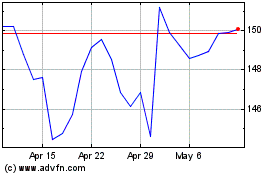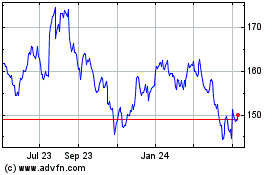Study Suggests Heart-Disease Patients May Need Fewer Blood Thinners
November 14 2016 - 1:27PM
Dow Jones News
By Ron Winslow
NEW ORLEANS -- Researchers said a study involving reduced doses
of Johnson & Johnson's anticoagulant Xarelto suggests it may be
possible for patients with two types of heart disease to avoid the
need for three different blood thinners to protect them from stroke
and heart attack.
Between one million and two million patients in the U.S. and
Europe suffer from both a heart rhythm disorder called atrial
fibrillation and blockages in their coronary arteries that are
propped open with stents to alleviate chest pain.
Currently, such patients often get a total of three different
medicines -- aspirin and a drug called clopidogrel to keep
heart-attack causing clots from forming in stents, and either
warfarin or a new anticoagulant such as Xarelto to prevent
stroke-causing clots in atrial fibrillation. Each drug hits a
different target involved in formation of blood clots.
But so much blood-thinning causes more than 25% of patients to
suffer major and even potentially life-threatening bleeding
episodes.
"The concern this causes for patients is very big," said Michael
Gibson, a cardiologist at Harvard-affiliated Beth Israel Deaconess
Medical Center, Boston, and principal investigator of the new
trial.
The new, 2,100-patient study found that 16.8% patients treated
with a two-drug regimen -- 15 milligrams of Xarelto plus
clopidogrel -- suffered what researchers termed clinically
significant bleeding events, compared with 26.7% of patients
treated with warfarin, clopidogrel and aspirin. That amounts to a
41% reduction in risk of such bleeding.
Dr. Gibson said 18% of a third group of patients treated with a
three-drug regimen -- 2.5 milligrams of Xarelto plus clopidogrel
and aspirin -- suffered significant bleeding events.
The study also found that 5.6% of patients in the
warfarin-treated group suffered a heart related death, heart attack
or stroke, compared with 6% given 2.5 milligrams of Xarelto and
6.5% for those with the two-drug regimen including 15 milligrams of
Xarelto. But the number of such events in the study was too small
to enable researchers to conclude with confidence that the reduce
blood thinning regimens didn't put patients at higher risk of heart
attacks and strokes.
Dr. Gibson presented the data at the annual scientific meeting
of the American Heart Association. The results also were published
in separate papers in the New England Journal of Medicine and the
journal Circulation.
"We've hated to put patients on triple therapy," said Vincent
Bufalino, a cardiologist at Advocate Health Care, Oakland Terrace,
Ill., who wasn't involved with the study. He said doctors are
already treating some patients with just two drugs, generally
dropping aspirin and using clopidogrel and either warfarin or a
drug like Xarelto.
The study "makes us feel better about what we've been shifting
towards," he said.
Gabriel Steg, a cardiologist at Hopital Bichat, Paris, said a
previous, smaller study using a two-drug of warfarin and
clopidogrel (and no aspirin) in stent patients who also have atrial
fibrillation was effective in reducing bleeding. Though warfarin is
a difficult drug to use, that regimen would be cheaper than ones
involving Xarelto, he noted.
Write to Ron Winslow at ron.winslow@wsj.com
(END) Dow Jones Newswires
November 14, 2016 13:12 ET (18:12 GMT)
Copyright (c) 2016 Dow Jones & Company, Inc.
Johnson and Johnson (NYSE:JNJ)
Historical Stock Chart
From Mar 2024 to Apr 2024

Johnson and Johnson (NYSE:JNJ)
Historical Stock Chart
From Apr 2023 to Apr 2024
